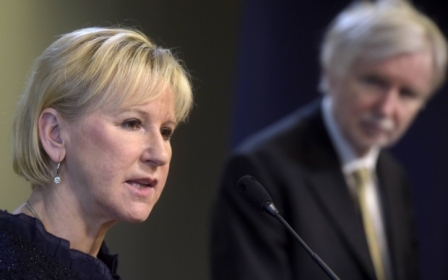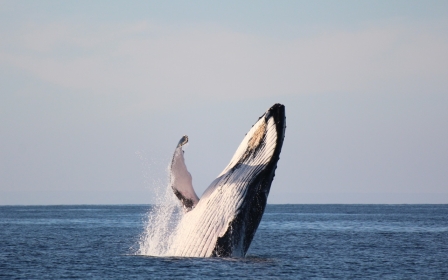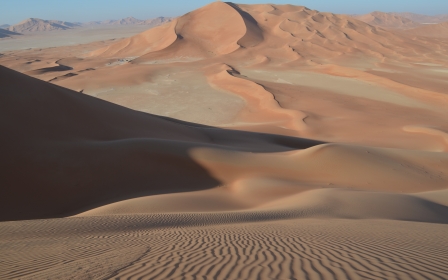ANALYSIS: Unlike its neighbours, Oman sees friend in Tehran

By Sarah MacDonald
Iran's ties with its Arab neighbours across the Gulf have long been strained but one nation - Oman - has carved out a unique and potentially crucial relationship with Tehran.
From Syria and Iraq and now the conflict in Yemen, Sunni Arab states led by Saudi Arabia have vied with Iran for influence in the Gulf and the greater Middle East.
The rhetoric has risen in recent days, with Iran saying a Saudi-led intervention against Shiite Houthis in Yemen is "dangerous" and could spark a wider conflict.
But unlike other members of the Saudi-dominated Gulf Cooperation Council (GCC), Oman has not joined the airstrikes in Yemen.
And Iranian media reports this weekend said Tehran had reached out to Oman to see if it can help end the strikes and find a political solution to the crisis in Yemen.
While these ties may raise hackles with some of Oman's fellow GCC members, experts say Muscat could also act as an important bridge for Iran, both for its neighbours and the West.
"Given the political sensitivities and the wide gap over regional security issues, any improvement of ties can function as a confidence-boosting measure that can help to overcome years of mistrust between the GCC states and Iran," said Kristian Coates Ulrichsen, Middle East Fellow at Houston-based Rice University.
Friendlier ties with Iran, he said, could even open up new economic opportunities for Gulf Arab states.
"Iran can offer the GCC states a significant and largely untapped regional market so any upsurge in relations will likely focus on economic and commercial benefit to both sides," he said.
Host for nuclear talks
Oman's unique role was highlighted last November when it hosted Iran, the European Union and the United States for talks on its nuclear programme.
After last week's potentially historic framework nuclear deal, US Secretary of State John Kerry thanked Oman for its "critical role in getting these talks off the ground in the first place".
Oman also mediated between Tehran and Washington for prisoner releases, including the freeing of three US hikers jailed in Iran on suspicion of being spies after they strayed across the border in 2009.
In 2012, it mediated the release of an Iranian woman, Shahrazad Mir Gholikhan, jailed by the United States for allegedly smuggling arms.
Mohammed Saad al-Muqaddam, a history professor at Sultan Qaboos University and expert in Iran-Oman relations, said Oman's ruler has long understood the importance of its neighbour across the narrow Strait of Hormuz.
Sultan Qaboos "talks of Iran as a neighbour with whom there should be good relations. Your neighbour will not move," Muqaddam said.
Since coming to power in 1970, the pragmatic Qaboos has carefully nurtured historic ties with Tehran, Muqaddam said.
That relationship has paid political dividends, as when Iran sent troops to help Oman quell the Dhofar rebellion - a leftwing uprising in the country's south - in the early 1970s.
Growing trade links
But it is increasing trade that is at the heart of the two countries' growing ties.
Tehran's ambassador to Muscat, Ali Akbar Sibeveih, said trade had rocketed in the past two years from $198m to $1.05bn.
"We are expecting in 2015 to see very much progress in the business relations between the two countries," Sibeveih told AFP, pointing to a number of recent deals.
Oman and Iran agreed last year to build an underwater pipeline to pump Iranian gas to the Omani port city of Sohar. Half of the 10 million cubic metres of gas pumped each year will go to Japan, India and South Korea, Sibeveih said.
Iran also plans to build and operate a $1.5bn 400-bed hospital in Barka, a city near Muscat, he said.
Iran "can offer much more in terms of future energy projects and perhaps even defence ties, given the two countries' shared interests in the Strait of Hormuz," said Christopher Davidson, professor of Middle East politics at Britain's Durham University.
A thriving unofficial trade also exists, with speedboats from Oman frequently crossing the strait to smuggle goods into sanction-hit Iran.
Part of the reason for Oman's independent path, experts say, is that with most of its citizens adherents to the Ibadhi branch of Islam, the country stands to some degree outside the Sunni-Shiite divide that colours much of Middle East politics.
New MEE newsletter: Jerusalem Dispatch
Sign up to get the latest insights and analysis on Israel-Palestine, alongside Turkey Unpacked and other MEE newsletters
Middle East Eye delivers independent and unrivalled coverage and analysis of the Middle East, North Africa and beyond. To learn more about republishing this content and the associated fees, please fill out this form. More about MEE can be found here.




